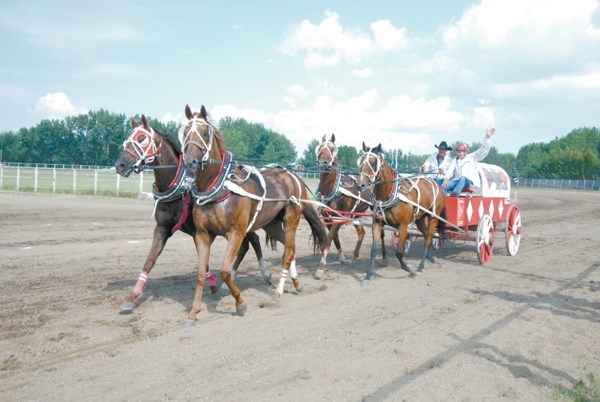The horses fidget in their starting positions, the whites of their eyes visible as the anticipation builds, and then they're off, twisting around the barrels in a flurry of dirt.
The drivers are yelling as they snap the reins, goading the horses on. The outriders race alongside the thunder of wagons as one, two, three turns go by. Then the pounding hoofs round the last corner as last-minute passes are attempted in desperation.
And, in just over a minute, the heat is over.
For Brian Laboucane, this is just another day at the office.
Not too many people are privileged enough to be doing what they love, but Laboucane has been at it for 41 years, years he considers well spent.
"It's just a wonderful sport, a wonderful way of life," he said.
Over the years, Laboucane has won six Canadian Professional Chuckwagon Association Championships and three trucks, as well as many other smaller prizes. Sunday, he won a halter, as well as taking home the first day money for fastest time of the day Friday.
Although Laboucane was the first in his family to enter the sport of chuckwagon racing, he's been around horses all his life, riding and breaking horses in his youth.
In 1969, Laboucane started driving a two-wheel chariot and outrode a bit on the side. He knew it was the life for him.
"I just go hooked on it," said Laboucane.
Over 41 years, he's seen a lot of changes in the sport. When Laboucane first started chuckwagon racing, drivers were paid $25 a day to run their horses, earning only a little extra for first, second and third place. Of course, expenses were much lower, but the sponsorship wasn't there either.
Now that there's more money involved in chuckwagon racing - Laboucane estimates 60 to 70 per cent of a driver's income comes from sponsorship - the sport has become more serious.
"It's like any sport, the more money that's involved, the more competitive it is," said Laboucane.
"I've won trucks by 13/100ths of a second and lost by 17/100ths of a second; it's serious business."
But although the level of competition has increased, Laboucane said it hasn't killed the comaraderie found among drivers, who will often lend their equipment, or even their horses to someone in need, even to someone competing in the same race.
"It's one of the few professional sports that you see that happen," he said.
Chuckwagon racing has also become a family affair for Laboucane. His 23-year-old son, Jamie, is following in his father's footsteps, winning two heats this weekend.
Two of his son-in-laws are also involved in the sport, one as a driver and one as an outrider, which makes some weekends seem like family reunions.
"It's great, we've got the grandchildren with us," said Laboucane. "To go down the road with everybody, it's a real family affair.
Over the years, Laboucane has met many people, travelling to Cheyenne, Wyoming, and to Manitoba twice each year to buy horses. He's also seen parts of Canada he wouldn't have seen if hadn't been for the sport.
But it's not all fun and games - a lot of work goes into racing horses, work that starts well before the racing season.
To prepare the horses for the races, which typically start the last weekend in May, training starts the beginning of April. The horses need to be shod, their legs worked and strengthened, their feed increased.
"You've got to look after these horses," said Laboucane. "They're athletes."
Just like any athletes, horses can be injured. Recently, one of Laboucane's horses, Spanish Honor, sprained his ankle when he slipped racing in Meadow Lake. Spanish Honor is one of Laboucane's favourite horses.
"He's kind of a special horse, just because he tries so hard every time."
When a horse is injured, it's a real set-back, because another horse has to be trained to fill the empty spot.
And the work doesn't stop there. Shipping the horses throughout Saskatchewan and Alberta, tending to leg injuries and maintaining the equipment, it all amounts to countless hours of work.
When the season ends in August, there's plenty of work to be done on the home front, with 240 head of cattle waiting to be looked after. Even winter offers little respite, as the horses spend the cold months indoors, and hay needs to be chopped for them.
"It's no holiday," said Laboucane.
Then what keeps Laboucane going?
"The love of the sport," he's quick to answer. "The thrill, it's an adrenaline rush. It has to be, to do all that we do to race for just over a minute."
But that thrill is not without danger. Laboucane himself has flipped six wagons. Fortunately, he hasn't been seriously injured, but not everyone is so lucky.
"There's been people killed running wagon, I've had friends die doing it," said Laboucane.
But he still thinks it's a worthwhile risk, to be doing what you love to do.
"People die on the highway, they die in their bathtubs. I think when your number's up, it's up," he said.
In Calgary, they let drivers compete until they're 65, which leaves Laboucane with four more racing years, although you'd never guess he was a day over 50. Without a doubt, Laboucane plans to spend the next four years doing what he loves, in the heat.

